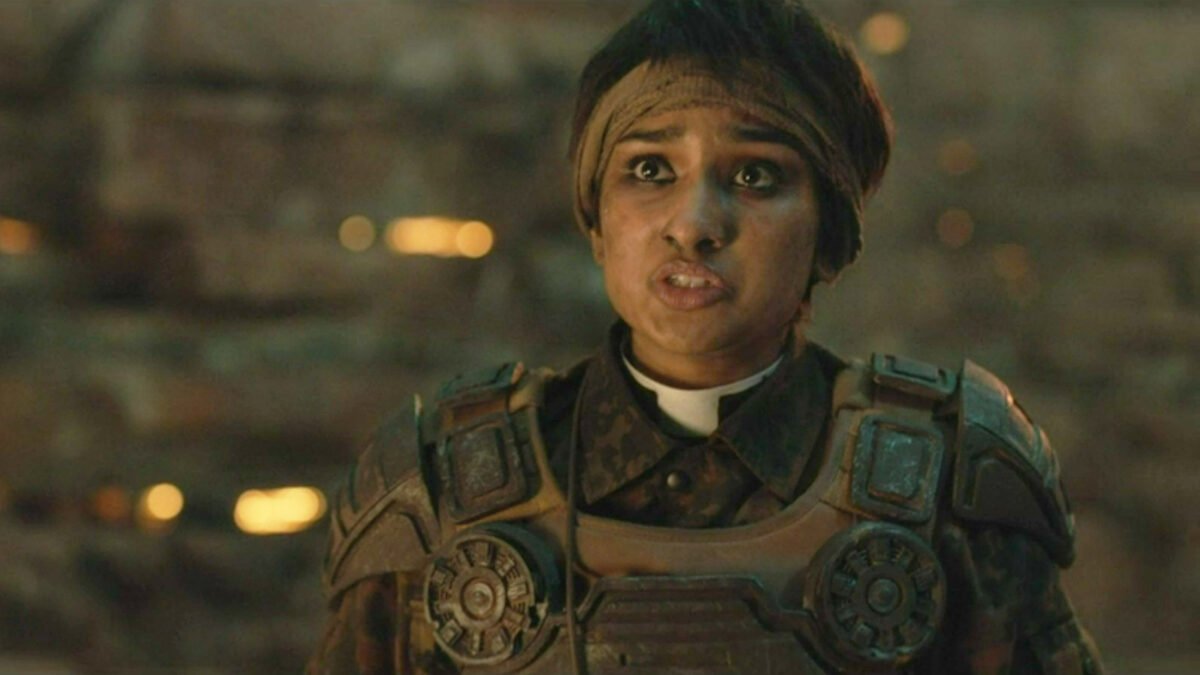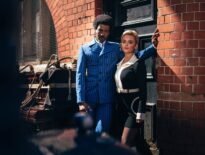Those of you who are kind enough to read my ravings on the DWC may have noticed that I’m not always totally enamoured with the stuff the editor of this site asks me to review.
I worry about this.
I appreciate people invest a lot of love into Doctor Who, and it’s not always nice for them to read articles slagging off stuff that they really like. A few may have clicked onto this article thinking, ‘Oh, not him again: he’s always really negative.’ So, pray allow me to reassure you, dear reader, from the outset: I thought Boom was really good.
Steven Moffat’s one of the best of the writers for 21st Century Who and he’s at his best when he’s not having to spread himself too thinly. Inevitably, writing eight or nine scripts a year when you’re the showrunner (and overseeing Sherlock at the same time) means you’re less likely to be able to produce another Blink or another The Empty Child. It just can’t be done; you can’t expect people to have brilliant and original ideas every time a deadline looms for yet another script. Good writers do occasionally pen the odd turkey; after all, it was Robert Holmes who wrote The Krotons.
Despite the pressure he was under, though, Moffat wrote some absolute belters for Matt Smith and Peter Capaldi. Perhaps not quite as good as his solo episodes during RTD’s first tenure. For what it’s worth, I think the vibe for Boom was pretty similar to a standard quality Moff script for Matt Smith: not quite brilliant, but very good nonetheless. (He wrote it like a Smith/Amy episode, too: you could easily imagine Matt Smith and Karen Gillan delivering the dialogue he gave to Ncuti Gatwa and Millie Gibson here. The Doctor’s lines sounded particularly Smithian.)
I suppose one could grumble and say it was a bit Moffat by numbers. Polite and softly spoken sinister robots, the Church of the future morphing into the army (great idea), futuristic ambulances going haywire and harming rather than healing. Actually, none of that bothered me. Moffat’s greatest hits are still great and we liked them last time, so it’s good to give them a replay. Was it just me, or were there echoes of Classic Who here and there, too? The ambulance shooting wires at people reminded me of Styre’s robot, and the ambulances appearing en masse at the rim of the quarry was reminiscent of the shot of the Daleks trundling up to the edge of the cliff to join the Master on the planet of the Ogrons. No? Okay, just me then.

The guest cast was splendid, too. When I first watched it, a great and mighty thought did strike me: Gosh! (opined I). Gosh! That actor playing Mundy Flynn is really really good, isn’t she? Genuinely impressive work by a talented actor; she really lifts that character off the page and gives a multi-layered performance. A totally believable human being. Really impressive.
I hadn’t realised at the time that it was Varada Sethu. Yes, I know I should have done. You have to forgive me for the infirmities of age. I knew a new companion had been cast but my ancient brain had not made the connection. If she’s anything like as good as the new female lead as she was as the Reverend Ms Flynn, we’re in for a treat. Presumably she’ll be playing a different character, but RTD’s lips are sealed, so we’ll have to wait and see. But it’s a great piece of casting and I think she’s going to be fab.
While we’re on casting… I confess I’m still not quite wholly convinced by Ncuti’s Doctor. I’d like to be. He’s a superb actor and he’s certainly got the talent needed. (My wife thinks he’s great.) Perhaps we’re in the same territory as we were with Pertwee and Capaldi in their early stories: good potential, but not quite there yet. A friend of mine at Bedford Doc Soc – we meet every month in the pub to chat and put the world to rights – commented that she thinks it takes a Doctor until his third year to fully find the role. There’s something in that, even if it’s not a universal rule. Also, the first two scripts for the Fifteenth Doctor concentrated on his fun side — we haven’t yet seen the character’s steel or his moral outrage. I’ve no doubt Ncuti Gatwa can deliver the goods but clearly he has to work with the material he’s given. We certainly saw his more serious side this week but can we have a bit more of the moral crusader, please? Millie Gibson is fine and I don’t like to criticise but so far, she’s a bit generic. And we’ve also had the ‘who is she really?’ question about the companion before, and I can’t really work up much enthusiasm for the resolution. So long as she doesn’t turn out to be the Doctor or the original Timeless Child, which would be really dull.
Was there a swipe at the euthanasia debate in the episode? Hmm. Maybe. I taught Religious Studies for 20 years, so I had to take successive generations of students through the arguments pro and con for their GCSE in RS. This isn’t the place to rehash those arguments – though they’re topical, as the issue’s being discussed by politicians at the moment (though they’ve got something else on their minds right now). Just to say that one of the cons of allowing euthanasia is that the right to die can slip into the duty to die, and then possibly even to giving other people the right to decide when a life should end. It wouldn’t be nice if some bit of AI in hospitals 10 years from now coolly weighs up a patient’s condition and decides to do the kindest thing. Especially because people are expensive and the budget for keeping someone alive could best be spent elsewhere.

I’m not really sure, either, that Doctor Who (or any other drama) is the place to air writers’ views on religion or ethics. Classic Who was silent about the Doctor’s religious views; it looks as though the cancellation of (the excellent) The Masters of Luxor was because the themes were too religious and because it ascribed theism to the Doctor’s race. It used to be the case in the UK that it was generally considered to be slightly bad manners to talk about religion or politics, for fear of giving offence. Doctor Who used to have a similar reticence, except for the Buddhist Doctor in Planet of the Spiders, of course. The Doctor in current Who is explicitly non-religious, though different writers seem to have different emphases: curiously, Jodie Whittaker’s Doctor was the most sympathetic to Christianity, while David Tennant’s dismissed the resurrection as unhistorical.
I’m a bit uneasy with all this. Steven Moffat’s writing doesn’t present the Doctor as actively hostile and his portrayal of religious characters is always sympathetic; he handled the papacy sensitively in the Capaldi stories. I’m not terribly comfortable, though, with Ncuti’s saying that faith stops people from thinking for themselves (it can do, but it doesn’t necessarily do so). It’s not confined to the left, but there can be a knee-jerk bias against Christianity in particular, and an assumption that theism is simply nonsense. I also wonder how many Hindu, Muslim, Jewish and Sikh viewers feel about the Doctor’s new found atheism. I expect it makes them wince, and I expect it makes some rather unhappy. Wouldn’t it be best to follow the wiser silence of the classic series, and just avoid the issue altogether?
And the episode closes with the final line from Philip Larkin’s An Arundel Tomb: ‘What will survive of us is love.’ A lovely poem and a good point to finish on, though I’m going to be pernickety and note that: a) it was slightly misquoted, and b) I doubt the Doctor would have been friends with Larkin. Larkin had his good side, as every human being does, but his staunchly-held views on race were closer to the contemporary National Front than to anything in mainstream politics and I suspect the Doctor would have found him repellent. (Always a quandary, this: what should you do when genuinely great work is produced by someone who’s not very nice? Avoid it, or ignore the creator and enjoy the creation?)
Just a couple of final thoughts, then.
I’ve found the RTD2 era so far to be very uneven. I liked The Giggle and I quite liked The Star Beast but otherwise, I’ve not really enjoyed much of it. (I was being kind to Wild Blue Yonder in my DWC review; I don’t think it was that great.) I share the view of many others in that I worry the tone has changed too much and that the envelope has been pushed too far; there’s a danger that Doctor Who no longer belongs to the science fiction / horror genre at all, but to something radically different. But it took Davies’s first era, back in 2005, a little while to find its feet; let’s hope the same is true of his second era and that Boom marks a return to form.



